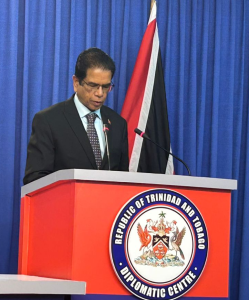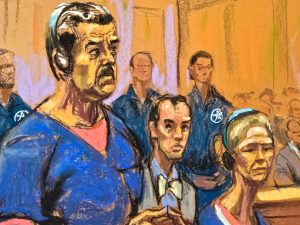‘Not surprisingly, both the US and Caribbean media rarely focus on the men who are educated, intelligent, honourable, reliable, engaged in voluntary activity and family-centered’
By Dr Jerome Teelucksingh
IN the early 1990s there was a sudden increase in suicides in Trinidad which was blamed on the breakdown in family life.
Such a lack of social control is attributed to the negative influences of the US media which lead to copycat homicides.
An illustration is the murder-suicides that occasionally occur in the Caribbean when a husband kills his family then himself due to depression or domestic problem.
Men are the overwhelming majority of the participants in the world’s wars. The power struggle which unfolded in the Iraq-United States conflict and the destruction of Afghanistan influenced gender relations in the Caribbean. The image is strongly reinforced that US men were responsible for this destruction and sadness.
The fate of the world and the lives of millions are in the hands of a few political leaders from developed countries who were obsessed with power and control. The displays of uncontrolled aggression and hate as evident in the wars were expected from men whilst the women are deemed compassionate caring and peace-loving. Such animosity creates a rift among men and affects gender relations with women who suffer as sons, boyfriends and husbands are lost during wars.
President George Bush and a few of his gullible friends claimed that the dictatorship of Saddam Hussein was the sole reason for the intervention of Iraq. However, thanks largely to Michael Moore’s seminal documentary Fahrenheit 9/11, many in the Caribbean are fully aware of the economic links and the oil reserves in the Middle East which attracted Bush’s attention.
There needed to be the realisation that “one powerful form of directing minds is the systematic non-attention by the mass media to things that deserve attention” (Marlin, 2002: 160). The actions of US leaders demonstrate the hypocrisy and lack of hindsight of male politicians. In the Caribbean there is also little faith in politicians who are corrupt, deceptive and constantly accused of nepotism.
Wars are glorified as the success and joy of victory tend to be the stamp of approval for future conflict. The reporting of the war by US networks such as CNN and NBC are proof of their limited agenda.
Two news values which determine the content of such news is negativity implying that bad news is favored over positive events. And, secondly, the meaningfulness which is the coverage of events which meet the expectations of the viewers (Davis and Mules, 2002).
Not surprisingly, both the US and Caribbean media rarely focus on the men who are educated, intelligent, honourable, reliable, engaged in voluntary activity and family-centered.
US models of competitive, aggressive males contribute to an increase in international instability. This stems from one of the basic elements of American masculinity which is the “aura of manly daring and aggression” (Kimmel, 1999:112).
Militarised maculinities develop in threatened and war-torn societies. The absence of dialogue and diplomacy is an indicator of the urgent need for an immediate reshaping of a strongly masculinised political culture which reflects the patriarchal society.
West Indian males are socialised into a mode of violence. For instance, boys play with toy soldiers, action figures, toy guns and trucks.
On the contrary, girls are given dolls and expected to avoid fights and traits of a tomboy. Also, they are expected to develop an intuition for fashion and style, be graceful and family-centered.
The West Indian society perpetuates an aggressive male especially with the exposure of young minds to US computer games as Mortal Kombat. The violent games, available in Atari, Nintendo, Game Boy, Sega Genesis and PlayStation, have an overall desensitisation effect as violence gradually becomes accepted as the norm. This leads to a flawed acculturation process for Caribbean males.
Boys are reared to be tough, not to cry and bear pain. Thus, young men are more likely to bear pain, hide illnesses or delay visits to the doctor. These prescribed roles of toughness are learnt from the cinema in movies featuring Sylvester Stallone, Arnold Schwarzenegger, Jackie Chan, Jet Li, Jean Claude Van Damme, Clint Eastwood and Steven Seagal.
These have been idolised by millions of Caribbean males. Such television reruns as Miami Vice, and movies as Die Hard, Terminator and Robocop have heavily influenced West Indian masculinity.
These heroes and role models have no diseases, no sicknesses, are muscular, possess attractive or neat hairstyles, and are able to endure a high threshold of pain. In contrast, the bad guys in the movies and television shows are the less attractive and less well-built males (Dotson, 1999).
Dr Jerome Teelucksingh is an activist. He initiated the inaugural observances of International Day for the Elimination of Violence Against Men and Boys (January 31) and World Day of the Boy Child (May 16). He has made academic presentations at tertiary institutions including Harvard University and Oxford University.
See other articles by Dr Jerome Teelucksingh on AZP News:
Defining Caribbean Masculinity
Is Monogamy Encouraged in the Caribbean
Naps Girls: From Humble Beginnings to Excellence
US Media Creates Cultural Dependency in the Caribbean
Bloodless Revolution to Save Lives in Developing Countries
The Need for a Social and Moral Revolution
The Law of Supply and Demand in Developing Countries
End the Dependency for Developing Countries
T&T Carnival and the Emperor’s New Clothes
The Influence of Labour on Caribbean Integration
The illusion of political Unity
Presbyterians in Trinidad: Humble Missionaries, Local Workers
Religious Plurality: Curse or Blessing
Caribbean Youth Need Optimism, Patriotism
Rethinking Identities in Caribbean, Latin America
November 19: All Inclusive International Men’s Day
Should International Agencies be Blamed for Unemployment
A Need to Observe Word Unemployment Day
An Ideology for the Trade Union Movement
The Man who Couldn’t be Prime Minister
Social Outburst vs Social Revolution
Challenges of the Men’s Movement
If George Floyd was Denied Parole
The Meaning of Indian Arrival Day in T&T
International Men’s Day – A Way of Life
Wounds that cause school violence
May Day: A Time for Solidarity, Strength
Who Coined the Term ‘Black Power’
The illusion of political Unity
Presbyterians in Trinidad: Humble Missionaries, Local Workers
Religious Plurality: Curse or Blessing
Caribbean Youth Need Optimism, Patriotism
Rethinking Identities in Caribbean, Latin America
November 19: All Inclusive International Men’s Day
Should International Agencies be Blamed for Unemployment
A Need to Observe Word Unemployment Day
An Ideology for the Trade Union Movement
The Man who Couldn’t be Prime Minister
Social Outburst vs Social Revolution
Challenges of the Men’s Movement
If George Floyd was Denied Parole
The Meaning of Indian Arrival Day in T&T
International Men’s Day – A Way of Life
Wounds that cause school violence
May Day: A Time for Solidarity, Strength
Who Coined the Term ‘Black Power’
![]()













